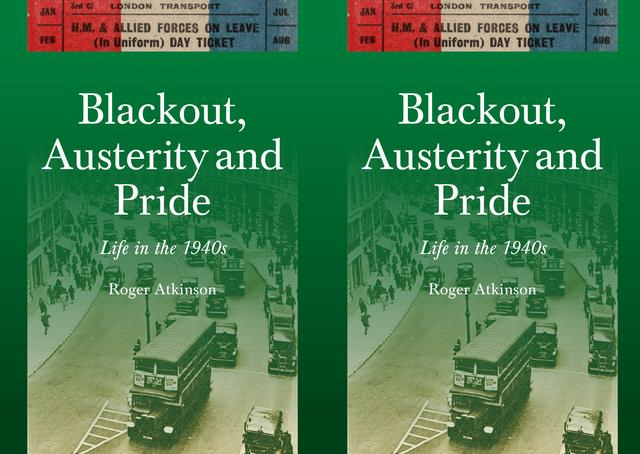Blackout, Austerity and Pride. Life in the 1940s.
Review

Blackout, Austerity and Pride. Life in the 1940s, Roger Atkinson, Roger Atkinson Publishing, Chester, 2015, hardback, 368 pp., £22.50, ISBN 97809933007
This illustrated memoir, recalled primarily ‘from actual experience’ relates how ‘an alert and intelligent boy, effectively orphaned at the age of 13’ set out ‘to gain a foothold in life’. Blended into the autobiographical thread are reflections on aspects of wartime, for example, evacuation, life in the blackout and the universal use of bus services, continuing into the post-war era recalling the all-in wrestling, courtship, continental holidays and references to many particular places in Yorkshire, Lancashire, East Anglia, Scotland, the Midlands and post-war London. Reflecting upon the Great Smog of London of 1952 which hastened clean air legislation he recalls that he was ‘fully familiar, for example, with descending into Halifax, only partially visible through the smoke which hung over it, but it was nor impenetrably foggy in the town itself’, but ‘it was only in London, living in Hanwell, that I remember a trolleybus conductor having to get off the bus in West Ealing and simply walk in front of it to the Hanwell depot, leading a line of trolleybuses, with heaven knows how many other vehicles tagging along behind. For no obvious reason, the smog had become quite impenetrable for nearly a mile’. Such reminiscences bring vividly to life aspects of the not so distant past which might be hard to find elsewhere in the historical record. Moreover, as an obsessive collector and retainer of a wide range of public transport tickets of all kinds he is able to illustrate particular reminiscences with photographs of for example of a season ticket for the trolleybus/underground from Hanwell to Chancery Lane with a detailed commentary on the features displayed.
There are more extended reflections on such subjects as religious observance which are pervaded by snatches of dialect. Recalling references to ‘chapel folk’ in Shelf near Halifax which revealed that ‘Methodists would always have a drawing room, never entered nor used on any day except Sunday, with dust covers over all the furniture’ he reports an exchange with a lady called Lily who asked him ‘Did tha see t’front room?’ continuing ‘Nay, tha wouldn’t; they’d (the Methodists) never let anyone see it’. For balance, he then records a more positive recollection of Methodists in Chester.

